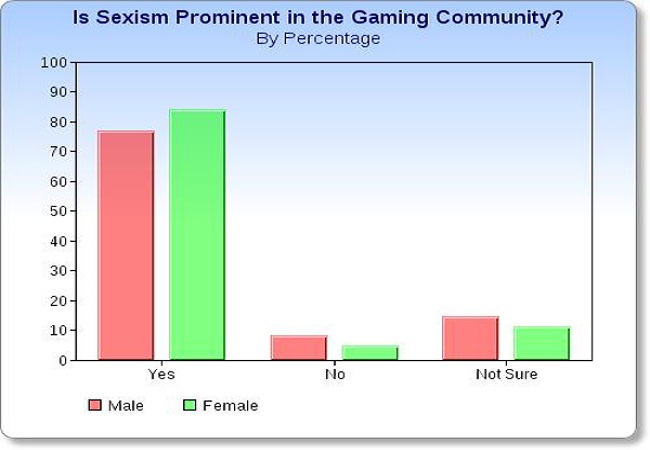In some ways, it’s crazy to think that women were given the right to vote in most parts of the Western world a mere 90 or so years ago. The idea of people not being allowed to vote based on, well, just about anything is an almost laughable thought for most people of this generation. While women’s rights have obviously come a long way since then, receiving extra boosts in the early sixties and early nineties, it’s clear in some ways that sexist, bigoted thinking still exists. In fact, it could even be argued that the effective removal of sexism from our legal systems has allowed sexism to fluorish in more recently-developed areas of our culture virtually unchecked.
A recent survey conducted by Emily Matthew for the Pricecharting blog reveals that sex-based insults are running rampant in video-games. In the study involving 873 participants, 79.3% agreed that sexism is prevalent in gaming. 63% of women claim to have been taunted with sex-based insults and threats, compared to just 15.7% of men. As a result, 67.5% of women playing video-games would conceal their gender where possible to avoid such harassment. While not necessarily surprising, it still reveals that – when provided with the cover of an in-game avatar or outright anonymity – people will make liberal use of sex-based insults.
Along with the internet in general, the world of video-games has given the embittered, bigoted, or outright juvenile people of the world an anonymous voice. No past time in history offered the ease with which we can get heard by so many, while revealing precious little about ourselves. For those who get pleasure out of provocation, anonymity equals power, and the corrupting influence of power has it that many of the insults we hear in gaming are in fact grossly exaggerated versions of these peoples’ actual beliefs. Sometimes, it’s unlikely that these people even believe the things they say, but simply know which buttons to press – racism, sexism, homophobia – to get the biggest reaction.
For a long time associated with spotty, masturbatory teenagers, the gaming demographic has diversified in more recent times, particularly with the rise of MMO games, which have an appeal that transcends the genders. With MMO’s, the level of interaction with other gamers has increased tenfold. Yes, online shooters like Battlefield 3 rely hugely on communication, but most of the talk in such games is focused on combat and objectives. Of course there will always be some banter and trash-talk, but it’s really in MMOs that we can really see the effect that the buffer of a digital avatar can have on how people communicate.
However, while most people have enjoyed the more personal level of interaction offered by such games, others have exploited it, using it to inflame, provoke and insult their fellow gamers. After all, it’s much harder to get a reaction – or, better still, a reputation – for saying something profound and positive than it is for being an annoying little shit (or troll, as they’re well known). The very fact that there isn’t an antonym for the word troll i.e. someone who makes a habit of lightening up people’s days, rather than ruining them, is telling in itself. Maybe Elf? No, anyone labelled such a thing would probably be accused of being a bender (or faggot, for you Americans) in the current online climate.
Whether the current culture of sex-based insults in gaming can really be called sexism is debatable. It’s offensive and unacceptable, but does it really reflect sexist sentiments? In society at large, sexism usually shows itself inadvertently, with the perpetrators being brought up with outdated views on gender relations often not realising how the things they say and believe are no longer socially acceptable.
Do we honestly think that the person who contacted Emily after she conducted her survey – calling her a slut who’d probably enjoy rape – interacts with women in the real world this way? Not likely, because he’d probably get a slap, or even get arrested. On a more speculative level, it’s unlikely that this person has had much success in intersexual relations, and tries to impose his insecurities on society’s easiest targets (women, ethnic minorites, gay people etc.). As such, do these insults really stem from deep-seated sexism? Or is it more likely from a combination of insecurity and the strange power frenzy that online anonymity seems to send people into?
For this unpleasant phenomenon, the term ‘pseudo-digi-sexism’ seems more fitting. How do we solve it? Stay tuned and I’ll get back to you on that one.


I’m another writer for the site, I must admit, I really liked this piece =]
Just stumbled across this comment. Cheers for the feedback, and look forward to reading some of your stuff!